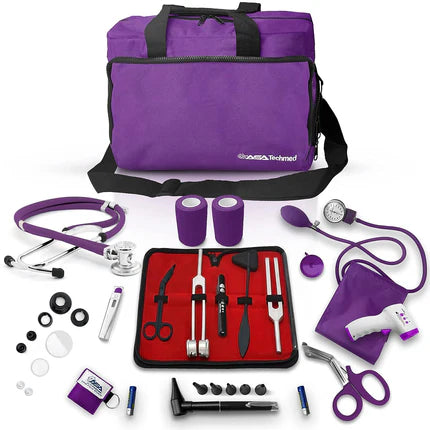As a nurse, you’re no stranger to long shifts, physical demands, and emotional exhaustion. Your workday is often spent on your feet, racing from one patient to the next, making decisions on the fly, and navigating an endless stream of challenges. It’s no wonder that by the end of the day, the last thing on your mind is fitting in a workout or preparing a healthy meal. But here’s the truth: maintaining your health and fitness is not a luxury; it’s essential for sustaining your energy, managing stress, and avoiding burnout.
If you’ve ever wondered how to prioritize your own well-being when time is so limited, you’re not alone. Here are some practical health and fitness tips for busy nurses that can help you maintain a balanced lifestyle, even on the toughest days.
1. Prioritize Movement Throughout Your Day
You don’t need a gym membership or hours of free time to stay active. As a nurse, you’re already moving for most of your shift, but that’s often in short bursts and can be quite stressful. Incorporating intentional movement into your day can help reduce tension and increase your overall fitness.
One simple way to get more movement is to take advantage of small breaks. Try a quick walk around your unit, or if you’re in a private space, do some light stretching or lunges. Even if it’s just for five minutes, these small bursts of activity can improve circulation and relieve muscle tightness.
Tip: Set a reminder on your phone or smartwatch to stretch or walk every hour during your shift.
2. Fuel Your Body with Balanced Meals
Nurses often face unpredictable schedules, making it difficult to sit down for a proper meal. But skipping meals or relying on fast food can leave you feeling sluggish and affect your performance. Prioritizing balanced, nutritious meals can help you maintain steady energy levels throughout your shift.
Pack meals and snacks that are easy to eat on the go but provide a balance of protein, healthy fats, and complex carbohydrates. Think of things like hard-boiled eggs, Greek yogurt, nuts, fruits, and whole-grain wraps. Prepping your meals ahead of time ensures that you have access to nourishing food, even when time is tight.
Tip: On your days off, set aside time to meal prep for the week. Preparing grab-and-go meals makes it easier to stick to healthy eating habits during a hectic schedule.
3. Stay Hydrated
Hydration is key to keeping your energy up and your mind sharp. But staying hydrated can be a challenge during busy shifts. You’re often so focused on patient care that drinking water becomes an afterthought. Dehydration can lead to headaches, fatigue, and reduced focus—things you definitely want to avoid while working.
Invest in a large, reusable water bottle that you can carry with you throughout your shift. Consider adding a squeeze of lemon or a pinch of electrolytes to your water to keep it refreshing and flavorful. Make it a goal to finish your bottle at least twice during your shift.
Tip: Keep your water bottle in sight—at your desk, near your station, or wherever you’re most likely to see it. This visual reminder will prompt you to drink more regularly.
4. Incorporate Strength Training into Your Routine
Nursing can be physically demanding, and incorporating strength training into your routine can help prevent injury and build endurance. Strength training doesn’t have to mean spending hours in the gym. You can get an effective workout in just 15-20 minutes a few times a week.
Bodyweight exercises like squats, lunges, push-ups, and planks can be done anywhere, including at home. These exercises target your major muscle groups, helping you build strength and endurance that translates to your daily tasks at work, like lifting patients or moving equipment.
Tip: If you’re short on time, try a quick circuit workout at home. Do three sets of bodyweight exercises, focusing on different muscle groups, in less than 20 minutes.
5. Make Sleep a Non-Negotiable
We know—it’s easier said than done. But sleep is one of the most critical components of your overall health. Without proper rest, you’re more likely to feel stressed, make mistakes, and experience physical fatigue. While your shifts may make a regular sleep schedule difficult, you can still improve your sleep quality by creating a calming bedtime routine.
Avoid caffeine before bed, dim the lights, and try to wind down at least 30 minutes before you plan to sleep. Even if you’re not able to get a full eight hours, quality sleep can make a huge difference in how you feel the next day.
Tip: If your schedule allows, take short power naps on your days off or between shifts to recharge. Even a 20-minute nap can boost your energy and mood.
6. Practice Stress Management Techniques
Nursing is one of the most stressful professions, and chronic stress can take a serious toll on your health. Incorporating stress management techniques into your routine can help you cope with the daily pressures of your job.
Deep breathing exercises, mindfulness, and meditation are all effective ways to manage stress. Take a few minutes during your break to close your eyes, breathe deeply, and focus on calming your mind. Even a short practice can help lower your stress levels and improve your mood.
Tip: Use an app like Headspace or Calm to guide you through quick, 5-10 minute meditation sessions during breaks or before bed.
7. Get Outside Whenever Possible
Spending time outdoors is an often overlooked way to boost your mood and improve your overall health. Whether it’s during your break or after your shift, stepping outside for a few minutes of fresh air and sunshine can reduce stress and improve your mental well-being.
If you’re able to, go for a walk in a nearby park or just spend a few moments enjoying nature. The simple act of being outdoors can help clear your mind and give you a sense of relaxation.
Tip: Try to schedule at least one outdoor activity on your days off, whether it’s a hike, a bike ride, or just a leisurely walk. It’s a great way to refresh your body and mind.
8. Connect with Fellow Nurses for Support
Nursing can be an isolating job at times, especially when you're overwhelmed with responsibilities. Connecting with your fellow nurses can help you feel less alone and provide valuable support. Share tips, struggles, and successes with each other—it’s helpful to know you're not the only one navigating the challenges of a demanding career.
Consider starting a fitness or wellness challenge with your coworkers. Whether it's a step challenge, a healthy eating challenge, or a yoga session after work, having accountability from your peers can keep you motivated.
Tip: Use social media or nursing forums to find online communities of nurses focused on health and fitness. Joining these groups can offer encouragement and new ideas to keep you going.
Your Health and Fitness Matter
As a nurse, your job is to take care of others, but it’s just as important to take care of yourself. By making small, intentional changes, you can improve your health, boost your energy, and prevent burnout. Start with one or two of these health and fitness tips for busy nurses, and gradually build them into your routine. You don’t need to be perfect, just consistent.
Remember, you deserve to feel your best—because when you’re healthy and strong, you’re better equipped to care for your patients and enjoy your life outside of work.
















